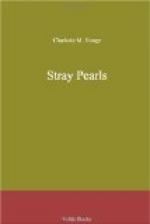They had been Huguenots, but had joined the Church some twenty years before, as it was said, because of the increased disabilities of Huguenots in the legal profession, and it was averred that much of the factious Calvinist leaven still hung about them. At this time I never saw the parents, but Eustace had contracted a warm friendship with the son, and often went to their house. My mother fretted over this friendship far more, as Annora used to declare, than if he had been intimate with the wildest of the roistering cavaliers, or the most dissipated of the petits maitres of Paris. But Eustace was a man now, made older than his twenty-five years by what he had undergone, and though always most respectful to my mother, he could not but follow his own judgment and form his own friendships. And my mother’s dislike to having Clement Darpent at the Hotel de Nidemerle only led to Walwyn’s frequenting the Maison Darpent more than he might have done if he could have seen his friend at home without vexing her.
I do not think that he much liked the old Counsellor, but he used to say that Madame Darpent was one of the most saintly beings he had ever seen. She had one married daughter, and two more, nuns at Port Royal, and she was with them in heart, the element of Augustinianism in the Jansenist teaching having found a responsive chord in her soul from her Calvinist education. She spent her whole time, even while living in the world, in prayers, pious exercises, and works of charity, and she would fain have induced her son to quit secular life and become one of those recluses who inhabited the environs of Port Royal, and gave themselves to labour of mind and of hand, producing works of devotion and sacred research, and likewise making a paradise of the dreary unwholesome swamp in which stood Port Royal des Champs. Clement Darpent had, however, no vocation for such a life, or rather he was not convinced in his own mind that it was expedient for him. He was eight or nine years old when the conversion of his family had taken place, and his mother had taught him carefully her original faith. Her conversation had been, no one could doubt, most hearty and sincere, and her children had gone with her in all simplicity; but the seeds she had previously sown in her son’s mind sprang up as he grew older, and when Eustace became his friend, he was, though outwardly conforming, restless and dissatisfied, by no means disposed to return to Calvinism, and yet with too much of the old leaven in him to remain contented in the Church. He was in danger of throwing off all thought of faith and of Divine things in his perplexity, and I know many of our advisers would say this was best, provided he died at last in the bosom of the Catholic Church; but I can never think so, and, as things stood, Eustace’s advice aided him in remaining at that time where he was, a member of the Church. My brother himself was, my mother ardently hoped, likely to join our communion.




